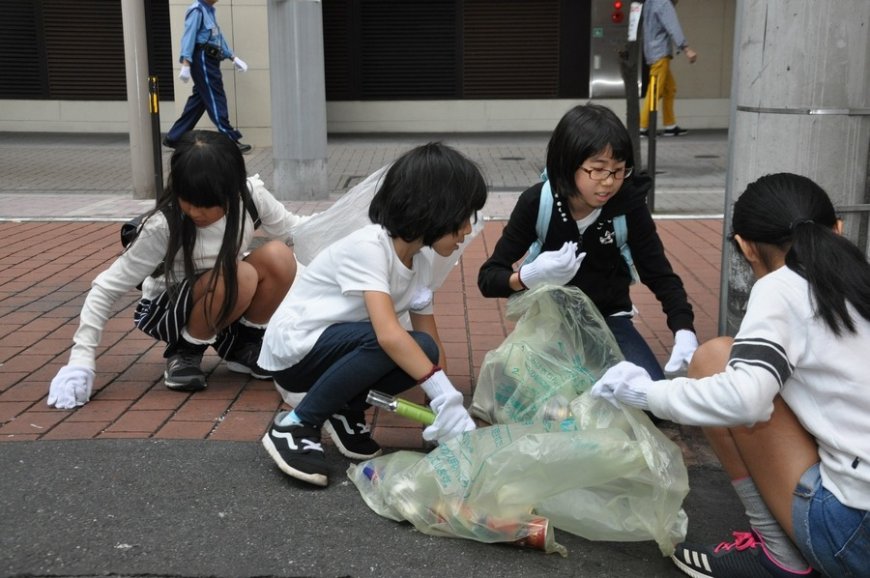A toothbrush in the lunchbox and cleaning the school - what the Japanese education system looks like
significantly influenced by the Japanese education system, so it is worth taking a closer look at it. A toothbrush in the lunchbox and

During the last football world cup, one of the sensational news was that the players of the Japanese national team cleaned the cloakroom they used and left a thank-you note written in Russian for the hosts. And although such behavior should be the norm, no one expected it from any representation, especially after a defeat. Such behavior is significantly influenced by the Japanese education system, so it is worth taking a closer look at it. A toothbrush in the lunchbox and cleaning the school.
Hell of exams
In Japan, the school year runs from April to March and is divided into three semesters, separated by two-month summer holidays, winter and spring breaks. each has about 40 people. Nevertheless, teachers have no problem with controlling their students. A teacher is a highly respected profession in Japan. Classes are usually held from 8 am to 3 pm and there is a long lunch break between them. In the mornings, there are lessons in more difficult subjects that require more attention, and in the afternoons there are art and exercise classes.
In a Japanese school, grades are of little importance because tests and exams are much more important than them. Primary school, teachers prepare tests and their results provide information about the actual knowledge of the student. However, in secondary schools, regional examinations are carried out. The Japanese education system does not practice repeating a year, but students are still committed to their studies - to get into a better school or university, you need to pass your exams excellently.
Duties and Respect
When a person reads about the Japanese education system, the greatest amazement and appreciation are caused by the responsibilities of young Japanese people. From the earliest school years, students spend their breaks performing tasks. That is the domain of canteen workers and janitors in schools. Children serve meals, help in their preparation, but also take care of cleanliness in classrooms, toilets, and corridors. This teaches young Japanese people to respect public property and shared space, which - as you can see after the last World Cup - pays off in the future.
The duties of those on duty are not limited to erasing the blackboard. Because the Japanese school wants to prepare students for adult life in the best possible way. Therefore requires not only acquiring knowledge but also working for other people and caring for the environment. It is also very important that teachers set a good example and not only supervise the students. But also spend time with them during meals together in the canteen and clean the school.
Japanese Students Behavior
In Japan, respect for each other, especially for the elders, is extremely important, so in order to learn this from an early age. Thanks at school for everything - for the meal, for the activities carried out, for the help. Additionally, students of younger grades clean the rooms after additional classes of older students. Who at that time perform more difficult duties. It is a great lesson in collective responsibility and in living in a society based on the hierarchy of seniority.
Must Read: The role of a parent in a school conflict, or how to help solve it without harming either party
Taking care of the environment and personal hygiene
Japanese schools also try to instill in children the principles of caring for the environment and about personal hygiene. Therefore, it is the students' responsibility to separate the rubbish, and in some schools also to deliver it to waste recycling stations. Many schools have gardens where children grow plants. Pesticide-free vegetables and fruit are used to prepare meals in school canteens. A great way to teach respect for work and food. Schools often use products supplied by local farmers, which allows you to prepare healthy, ecological, and wholesome meals. And transport in a short distance does not burden. The environment as much as bringing food from the other side of the country.
The Japanese also take care not to waste food - students can distribute uneaten meals among themselves. After lunch, it's time to clean the dishes and ... personal hygiene, because in a Japanese school both students and teachers bring a toothbrush with them in the lunchbox and brush their teeth after each meal.
Good habits bear fruit in the future
In Japan, there is a belief that the habit of taking care of one's own hygiene. As well as the cleanliness of public space should be developed in citizens from an early age. Thanks to numerous duties, children are already aware of how much trouble is involved in preparing meals or taking care of cleanliness. Maybe in these matters, it is worth following the example of the inhabitants of the country of the blooming cherry trees? The example of adult Japanese participating in the World Cup shows that it is worth sharing in students. The ability to work in a group, responsibility for common space, pro-ecological habits, and ordinary courtesy.
